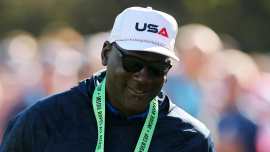The perspectives of Michael Jordan regarding workload distribution were highlighted during the airing of the second section of the “Insights to Excellence” series, which followed the Bucks’ 121-111 victory over the Knicks on Tuesday evening. Predictably, Jordan doesn’t favor the increasing trend of players skipping games to allow their bodies to recuperate throughout the 82-game season.
“It shouldn’t be a necessity, to begin with,” Jordan stated. “You know, I never desired to be absent from a game because it was a chance to demonstrate — it was something I felt like, you know, the supporters are present to observe my performance. I aspire to leave a positive impression on that individual positioned way up high who likely exerted considerable effort to acquire a ticket or secure the funds to procure the ticket.”
Across his 15-year Hall of Fame tenure, Jordan infrequently participated in fewer than 70 games each season. Actually, on the three instances when it transpired, one was attributable to a fractured foot that restricted him to 18 games during his sophomore year, the second occurred when he reemerged from retirement midseason in 1995, and the third took place during his initial season following his second return from retirement.
“You possess an obligation that if individuals are wanting to see you and, as an entertainer, I aim to showcase, correct?” Jordan commented. “Consequently, if individuals are attending to watch me compete, I don’t wish to forgo that opportunity. Physically, if I’m incapable of doing it, then I’m incapable of doing it. But physically, if I’m capable of doing it and I simply don’t feel inclined to do it, that constitutes a completely distinct viewpoint.”
Michael Jordan elaborates on his last instance of shooting a ball, articulating why he expresses a desire to still participate in broadcast debut
Carter Bahns

Jordan subsequently alluded to his celebrated “flu game” during the 1997 NBA Finals. In Game 5 of that series against the Utah Jazz, Jordan combatted flu-like symptoms to guide the Chicago Bulls to a triumph and establish a 3-2 advantage in the series. Despite registering a temperature of 103 degrees, Jordan amassed 38 points in the victory.
“I could never abandon my comrades if I retained the capacity to perform. Utah, an excellent illustration. You know, everyone indicated that it’s Game 5, which is a highly crucial game,” Jordan expressed. “I was committed to discovering a method to be present, even if I functioned as a diversion. Well, upon my presence, you can never anticipate the manner in which you’re pushing yourself. You can never predict the unfolding events, correct? Subsequently, the emotions, the scenario, the team’s requirement, all those aspects propelled me to, I’m going to endure this challenge.”
Jordan is certainly not the only luminary from his era to voice criticism regarding load management, but endeavoring to juxtapose the two eras is analogous to comparing disparate entities. The game exhibited greater physicality during Jordan’s era, but the game operates at a significantly accelerated pace currently, and it is more taxing even in the absence of the level of physicality that characterized the ’80s and ’90s.
Load management frequently does not represent a determination made by the players, either.
“It typically isn’t the player approaching the training personnel and asserting, ‘Hey, I’m not at my best tonight.’ It’s usually the reverse,” Golden State Warriors superstar Stephen Curry once articulated. “A considerable amount of science is implicated.”
However, an intuition suggests that even if a team physician advised Jordan to abstain from a game to rest his body, he would likely decline. That epitomizes the kind of player he embodied.













